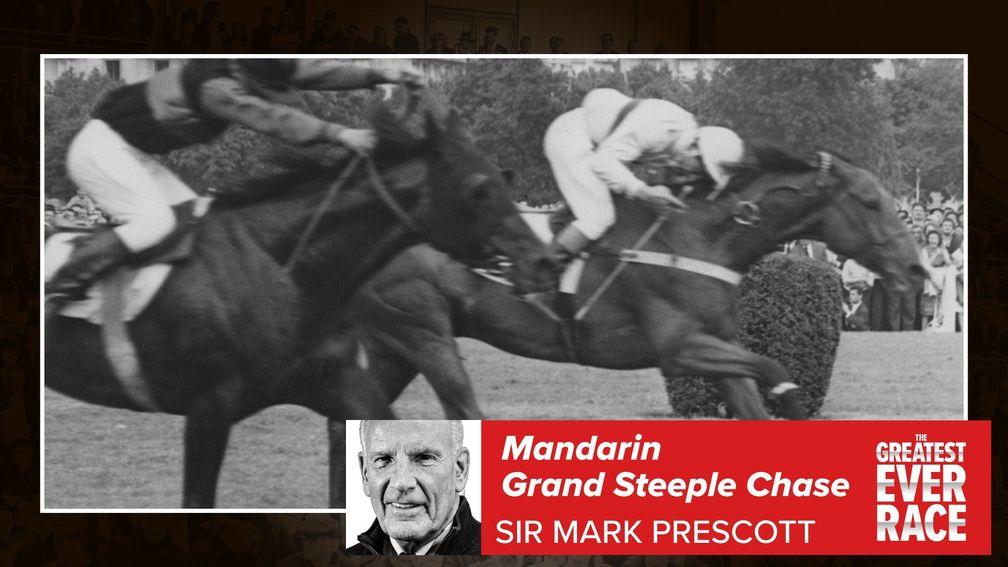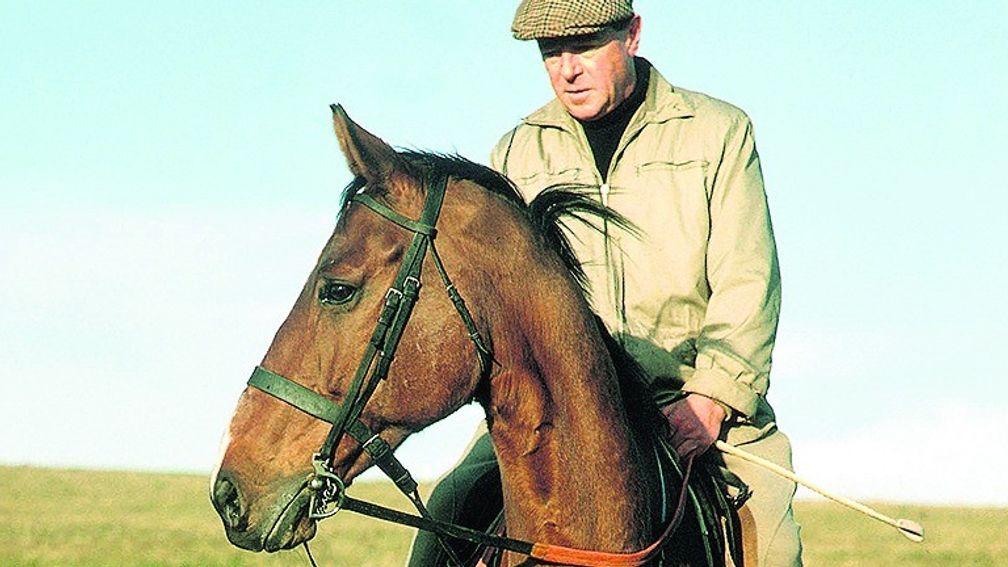The impossible made real: no steering, no brakes, but still triumphant

Voting has now closed for The Greatest Ever Race but you can still read our ten fantastic articles. Below, Newmarket trainer Sir Mark Prescott nominates Mandarin's victory in the 1962 Grand Steeple-Chase de Paris at Auteuil. The winner will be announced at racingpost.com at 6pm on Saturday, July 23.
Perhaps the most remarkable thing about the horserace I consider to be the greatest ever run is that none of us has ever seen it.
Much like the parting of the Red Sea, we know about Mandarin's victory in the 1962 Grand Steeple-Chase de Paris only through word of mouth and, of course, the journalism of John Oaksey (himself, as John Lawrence, a top amateur jockey).
I doubt anyone reading this was at Auteuil that scorching hot June afternoon, and although (I'm led to believe) a few brief clips of the contest are available to watch on the internet, they cannot possibly convey the full story.
There were two heroes, or maybe three if you include the competing French jump jockeys, who could have changed history but instead preferred to engage in a rare show of entente cordiale.
Mandarin was magnificent, not simply because, at the age of 11, he was winning the French equivalent of the Gold Cup just three months after landing the real thing at Cheltenham, but also because he achieved his greatest triumph despite straining the tendons in both forelegs during the race.
It is, however, primarily due to Fred Winter that the 1962 Grand Steeple-Chase has entered racing folklore. For on that day in Paris he achieved what should have been the impossible. For four miles around a twisting, turning circuit, composed of some of the sport's most daunting obstacles, he found a way of winning a championship race through most of which he had neither steering nor brakes, the horse's rubber-covered snaffle bit having snapped in two approaching the fourth fence.
At the time I was 14 years old and worked each day for local trainer Sid Kernick in Newton Abbot, Devon. I was in awe of Fulke Walwyn, who trained Mandarin, and also Fred. I would get to know them both over the years that followed, but at the time they were both simply distant heroes to me, men whose photographs I cut out of the papers and kept in scrapbooks.
It was at Buckfastleigh that I first encountered Fred. I was delivering a set of colours to the weighing room before racing started. Buckfastleigh, together with Newton Abbot and Devon and Exeter, opened the first six weeks of each National Hunt season as part of a West Country circuit.
It was a track Fred seldom visited, so on arrival he went out to walk the course. Before doing so he had placed his travelling bag on a bench by the weighing room door, unaware this was the exact spot where the local leading jockey, Jim Renfree, was accustomed to change.
Jim was a farmer from Cornwall. Although nowhere near as celebrated countrywide as Fred, he was the king of this particular castle and the top man around the sharp bends of Buckfastleigh, where his father trained legions of winners.
When Jim arrived and saw Fred's bag in his place, he picked it up and gently popped it out of the weighing room window before sitting down. Everyone then waited expectantly for the great man to come back. When he eventually did, Fred saw Jim sitting where he had left his belongings. He asked Jim if he had seen them. Jim nodded to the window behind him. Fred said simply, 'That's okay, Jim, I'll nip out and get them.'
There was no fight, no argument, nothing at all. Fred knew the protocol and accepted it.
Fred may have been a quiet man but he was tough. Astonishingly, he had ten years earlier done what he would later do aboard Mandarin. On that first occasion, he was riding a popular grey chaser called Shaef in the 1952 Cheltenham Gold Cup. The horse's bridle came over its ears when they made a mistake at the final water but Fred, without anything in his hands at all, still managed to drive Shaef into second place behind Mont Tremblant.
Mandarin wasn't Fred's only ride at Auteuil that famous day. Half an hour after the Grand Steeple-Chase he was due to partner Beaver for Ryan Price in France's version of the Triumph Hurdle. Unfortunately, because this horse was set to run off only 9st 11lb, Fred had been required to waste hard the previous night. His wife, Diana, reported later that the process had weakened him badly. Fred was not a well man when he got to the races.
Mandarin had suffered his own afflictions over a much longer period. I remember him well. He was a bright bay, wiry, ewe-necked horse who held his head high and who had already been fired twice. As a result he had enlarged, misshapen tendons, yet he seemed to return from these procedures, usually after a year off, as good as ever. Characteristically fiery, he wasted his energy by being edgy, but, on the plus side, he was full of courage and game as a pebble.
The injuries he sustained in France finally ended his career, yet he ran through the pain barrier to sign off in style. Following his retirement Fulke tried to turn him into his hack, but he later described him to me as being a "badly behaved nightmare" in that role. As a result, Mandarin ended his days, well into his mid-20s, as the stable pet.

Regrettably for Fred, Mandarin was the very epitome of a horse whose bridle you would never wish to break, given he was headstrong and regularly refused to settle in his races. With no bridle to steer the horse or to control his speed, Fred had to rely on his amazing body strength, matched by his determination and, also, in the early stages of the race, aided by the sporting assistance of the opposing French jockeys.
Somehow Fred managed to continually shift his weight to get Mandarin on the inside of another horse at every turn, of which there were many at Auteuil's figure of eight. There was a dicey moment at the vast Riviere des Tribunes water jump, right in front of the grandstands, but the horse largely played his part by jumping well and consenting to settle better than usual – "possibly due to having no bridle to fight," Fred mused in later years.
Lord Oaksey, as Audax in the Horse & Hound, records that as Mandarin went around the final bend he had six or seven lengths to find on the leader. He wrote that the horse – who by that point had already broken down – approached the penultimate fence, a bullfinch, "like a tank facing tissue paper".
With grim determination the pair galloped into the lead, but as they approached the finish the French horse Lumino was charging at them and Mandarin's stride began to shorten. It was impossible to separate them with the naked eye, but the camera showed the battle-weary Mandarin had held on by a head.
There is a famous picture of Fred and Mandarin being led back in triumph in front of the packed Auteuil grandstands. Man and horse are drained and exhausted. Mandarin's head is held low. Fred's eyes are half closed. Both had plumbed depths that neither previously knew they possessed.
After the race Fred was left so fatigued, dehydrated and weak that Stan Mellor remembered having to prop him up to get him into Beaver's silks before the next race. It goes without saying the great man won that one as well.
In 2007 Racing Post readers voted Fred's performance on Mandarin as the greatest ride in the history of the sport. For me, this race should also be remembered as the greatest race of all time.
A magnificent combination of jockey and horse found it within themselves to overcome apparently insuperable circumstances. They did it in a championship race, by a tight margin, on foreign soil. They overcame every sling and arrow that misfortune could hurl upon them.
What more could we possibly want of a horserace?
'Riding him was like sitting astride an electrified fence'
Mandarin's groom John 'Mush' Foster speaking to the Racing Post in 2007
I was Mandarin's groom throughout his whole career at Fulke Walwyn's yard, apart from a couple of years when I did my National Service in the army. I can tell you riding him was like sitting astride an electrified fence and, believe me, I'm not exaggerating one iota. He was a hard puller, and he would often whip round without notice. Indeed, he took such a pull he went out every day 20 or 30 yards ahead of the others in his lot, otherwise they'd have set him off.
But Fred understood the horse and they had a special bond. They'd won that season's Cheltenham Gold Cup, and Mandarin had come to France on an unbeaten sequence stretching over five races, including a Hennessy Gold Cup.
I remember the night before the race we went for dinner in a nice restaurant in Paris. After the meal, Mr Walwyn had the table cleared of plates and then he sketched a map of Auteuil's figure-of-eight course on the white tablecloth. He then discussed tactics.
Of course, plans went out of the window when the bit snapped at the fourth fence. But Fred's immense strength, particularly in his legs, was the reason they won at Auteuil. Racing Post readers got it exactly right in the poll, because that ride must rank as the greatest.
Don't miss the rest of this fantastic series here:
Brough Scott on Arkle v Mill House in the 1964 Cheltenham Gold Cup
Richard Hoiles on Crisp v Red Rum in the 1973 Grand National
Nick Luck on Secretariat's stunning win in the 1973 Belmont Stakes
Jessica Harrington on Grundy v Bustino in the 1975 King George
Chris Cook on Dawn Run's win in the 1986 Cheltenham Gold Cup
Rishi Persad on Dancing Brave's victory in the 1986 Prix de l'Arc de Triomphe
Lee Mottershead on Desert Orchid's win in the 1989 Cheltenham Gold Cup
Richard Forristal on Fantastic Light v Galileo in the 2001 Irish Champion Stakes
Patrick Mullins on Hardy Eustace v Harchibald in the 2005 Champion Hurdle

Stay ahead of the field with 50 per cent off the ultimate racing subscription. Enjoy the Racing Post digital newspaper and award-winning journalism from the best writers in racing. Plus, make informed betting decisions with our expert tips and form study tools. Head to the subscription page and select 'Get Ultimate Monthly', then enter the code WELCOME22 to get 50 per cent off your first three months. First three payments will be charged at £17.48, subscription renews at full monthly price thereafter. Customers wishing to cancel will need to contact us at least seven days before their subscription is due to renew.
Published on 1 July 2022inSeries
Last updated 12:53, 13 July 2022
- We believed Dancing Brave could fly - and then he took off to prove it
- 'Don't wind up bookmakers - you might feel clever but your accounts won't last'
- 'There wouldn't be a day I don't think about those boys and their families'
- 'You want a bit of noise, a bit of life - and you have to be fair to punters'
- 'I take flak and it frustrates me - but I'm not going to wreck another horse'
- We believed Dancing Brave could fly - and then he took off to prove it
- 'Don't wind up bookmakers - you might feel clever but your accounts won't last'
- 'There wouldn't be a day I don't think about those boys and their families'
- 'You want a bit of noise, a bit of life - and you have to be fair to punters'
- 'I take flak and it frustrates me - but I'm not going to wreck another horse'